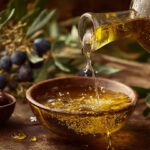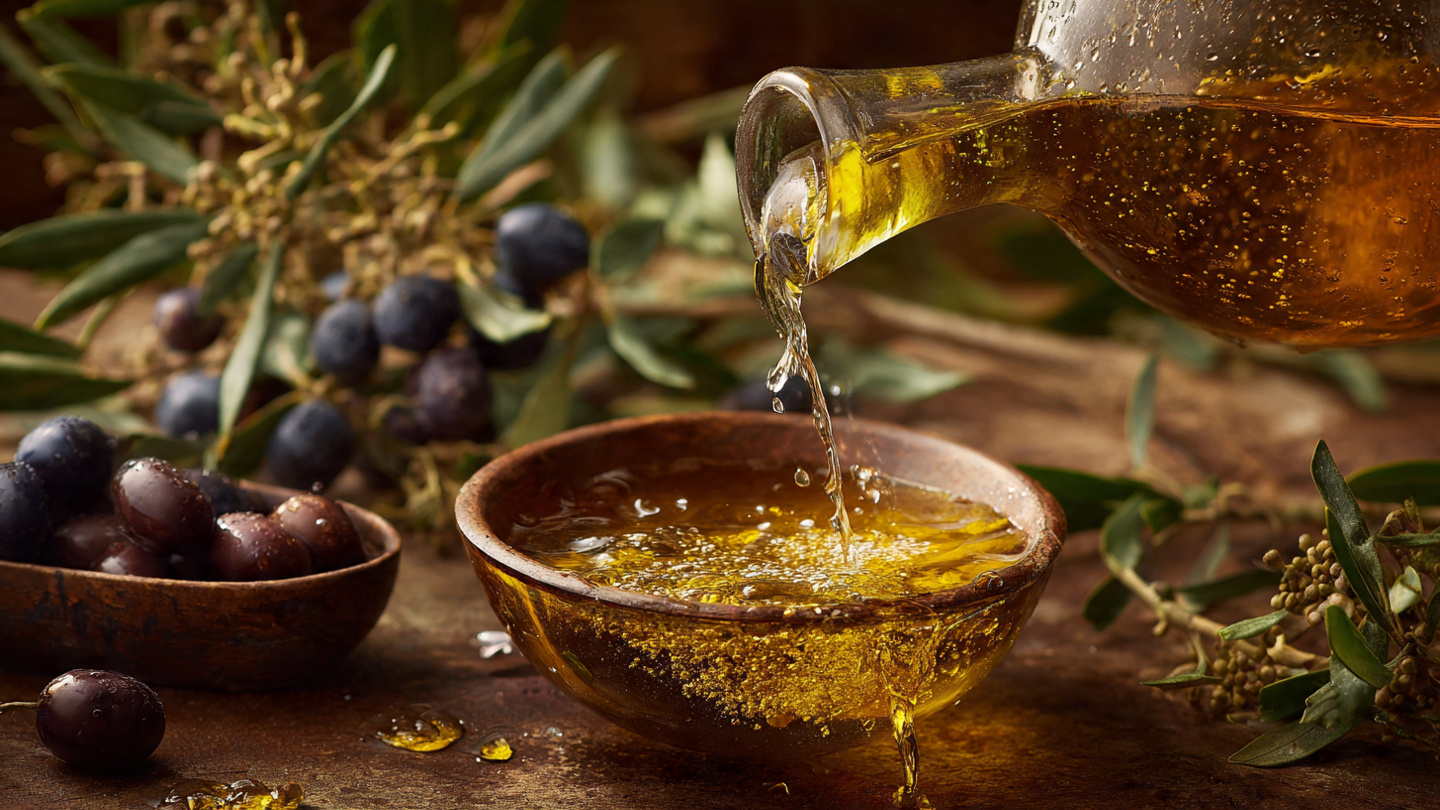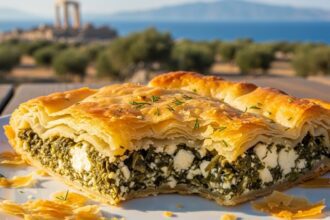To truly appreciate Greek Olive Oil is to understand its profound, divine origins that are inextricably linked to the birth of Hellenic Culture itself. According to Mythology, the olive tree was the most precious gift bestowed by the goddess Athena upon the people of Athens, securing her position as their patron deity. This sacred tree provided not only fundamental sustenance and light for the city but also the primary basis for trade and economic prosperity. From this moment of divine origin, the olive tree and its extracted “liquid gold” became sacrosanct, a powerful and enduring symbol of peace, longevity, and prosperity that permeates every single facet of Greek life even today.
For the discerning foodie and the intellectually curious luxury traveler, developing a deep understanding of Greek Olive Oil is absolutely essential to unlocking the true soul of the country’s cuisine. It is necessary to look past the generic labels that dominate global markets; Greece actually produces an astonishing array of single-estate, Indigenous Greek Olive Varieties whose complex flavor profiles are as varied and nuanced as those found in the world’s finest wines. In the mountainous regions near Mount Olympus, where the ancient world’s legends of the gods took hold, this precious liquid gold deserves the exact same level of dedicated connoisseurship and appreciation reserved for the finest Greek vintages like Assyrtiko or Xinomavro.
Decoding the Terroir: Mastering the Flavor Map of Indigenous Greek Olive Varieties

Just as high-end wine grapes express the unique characteristics of their terroir—the combination of soil, climate, and topography—so too do Indigenous Greek Olive Varieties. The resulting flavor profile of the oil—which can range dramatically from buttery and mild to intensely peppery and robust—is determined by the local climate, the specific soil composition, and, critically, the particular variety of the olive itself. To become a true Olive Oil Sommelier is to successfully navigate and learn this intricate flavor map of the Hellenic Peninsula.
Peloponnese: The Home of Robust Complexity
The southern Peloponnese region stands as the historical home to some of the most famous and dominant olive varieties in the country, consistently producing oils with exceptional stability and aromatic intensity.

Koroneiki This is arguably Greece’s most famous and widely planted variety. It yields an incredibly stable oil that is renowned worldwide for its intense, grassy aroma, its characteristic spicy, peppery finish—which is a reliable sign of a high concentration of beneficial antioxidants—and its vibrant green hue. This oil is the definitive expression of a robust, aromatic oil.
Kalamata While often mistakenly known only as a cured table olive, the oil pressed from the Kalamata variety is distinctly softer, slightly fruitier, and less intensely peppery than Koroneiki. This oil offers a beautiful, delicate middle ground that is ideally suited for dressing subtle, fresh vegetables and salads.
Northern Greece: Subtle, Fruity, and Rare Finds
Moving north, the regions like Thessaly (which surrounds the base of Mount Olympus) are historically famous for their rich dairy and meat production. However, these areas also produce unique, high-altitude oils often characterized by a more delicate, balanced complexity, reflecting the cooler climate and rugged terrain.

Maniatiki This is a versatile variety found throughout central Greece and parts of the Peloponnese, producing an oil that is notably fruity and medium-bodied. Its balanced nature makes it perfect for light cooking or simply finishing simple dishes where a strong flavor is not required.
Throumpa (Thassos) This is a rare variety, often naturally wrinkled and late-harvested, yielding an oil with a distinctive mild, buttery flavor and low acidity. This gentle character makes the Throumpa oil an excellent choice for baking or for delicately drizzling over fresh, creamy cheeses.
The Art of the Pour: Elevating the Experience with Greek Wine Pairings
The true, sophisticated joy of becoming an Olive Oil Sommelier lies in the thoughtful marriage of the oil’s texture and flavor with other complementary Greek staples. Here, the focus transcends simple food pairings to sophisticated Wine Pairings that effectively elevate both the quality of the oil and the complexity of the vintage.

For instance, the Robust Koroneiki oil, with its intense, peppery, and grassy finish, is best suited for finishing hearty legumes or roasted meats. Its ideal counterpart is the Xinomavro red wine from Naoussa or Goumenissa; the wine’s bold acidity and tannic structure perfectly cut through the oil’s intensity. In contrast, the Fruity Maniatiki oil, which is balanced and mildly fruity, is excellent for dipping or light salads. This lighter profile pairs exquisitely with Assyrtiko, the crisp, mineral-rich white wine from Santorini, which provides a sharp, refreshing contrast without ever overpowering the oil’s subtle notes. Finally, the Buttery Throumpa oil, very mild with low acidity and a slight sweetness, is ideal for drizzling over creamy cheese or delicate fish. This demands the pairing of Vidiano, a floral, medium-bodied white from Crete that complements the oil’s smooth texture beautifully.
Curating the Experience: From Grove to Taverna
For the traveler deeply focused on Luxury Gastronomy, the entire experience of Olive Oil Tasting must be seamlessly integrated into every step of the Greece Travel itinerary. This turns a simple trip into a culinary education.
An Organic Olive Grove Tour in Thessaly is the perfect place to start this journey. Here, on the lower slopes near Mount Olympus, one can learn firsthand about the meticulous harvest process—which typically occurs in the late autumn—and witness the traditional Milling process. Tasting the “agoureleo,” the oil pressed from the early harvest, provides a profound and unforgettable experience in flavor intensity.
Next, conduct the Taverna Test. When visiting a local taverna in a regional center like Volos or Larissa, always take the time to inquire about the source and variety of the oil they use. A truly quality establishment will proudly know the producer and the Indigenous Greek Olive Varieties used, as this simple act demonstrates a deep respect for the culinary tradition.

Finally, bring the experience home to your private setting, such as a Luxury Greek Villa. Dedicate a quiet moment to a formal tasting: pour small amounts of different regional oils into small glasses, sniff deeply for aroma (seeking notes of grass, almond, or citrus), and taste for flavor (bitter, fruity, peppery). The pleasant burn at the back of the throat is a welcome indicator of freshness and premium quality.
By actively learning to identify the subtle differences between these oils and understanding their divine, historical context, the Luxury Greek Escape transforms into a profound, sensory education. You are no longer just consuming a salad; you are engaging in a timeless ritual, a direct tribute to the gift of Athena, celebrated with every drizzle of this authentic liquid gold





















